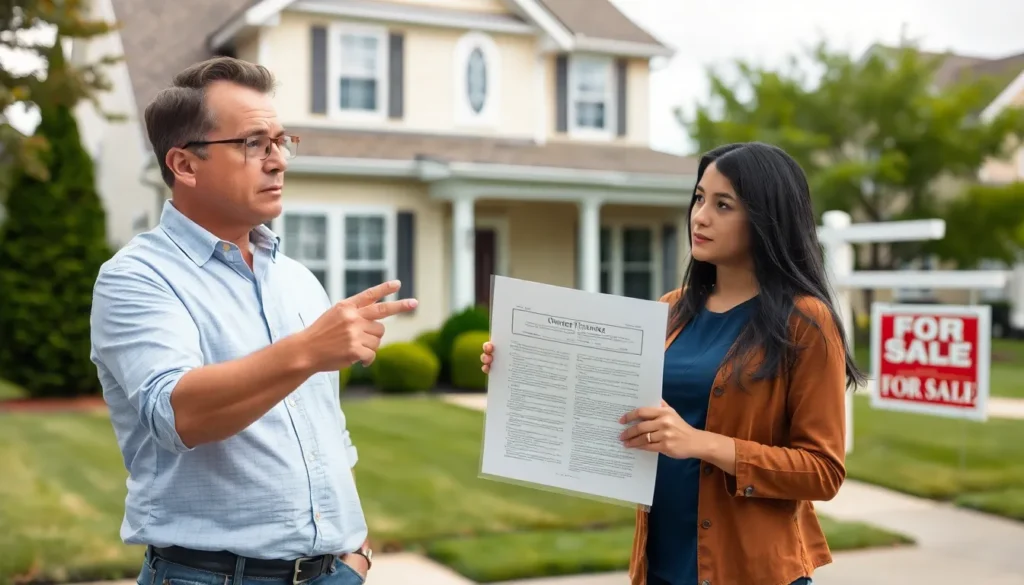Navigating the world of owner financing can feel like trying to solve a Rubik’s Cube blindfolded. It’s tricky enough without adding property taxes into the mix. So who’s footing the bill for those pesky taxes? Is it the seller, who’s probably still dreaming of their vacation in the Bahamas, or the buyer, who’s just trying to keep their head above water?
Understanding who pays property taxes in owner financing deals can save headaches and maybe even a few dollars. Whether you’re a seasoned investor or a first-time buyer, knowing the ins and outs of this financial arrangement is crucial. Dive in and unravel the mystery of property taxes—because nobody wants to be left holding the tax bill when the music stops.
Table of Contents
ToggleUnderstanding Owner Financing
Owner financing involves a transaction where the seller provides a loan to the buyer to purchase the property directly, bypassing traditional mortgage methods. This arrangement often simplifies the buying process for both parties, but raises questions about responsibilities such as property tax obligations.
Definition of Owner Financing
Owner financing allows the buyer to make payments directly to the seller instead of a bank. In this arrangement, the seller retains the title to the property until the loan is fully paid. Buyers benefit from easier qualification processes. Sellers gain potential tax advantages and a steady income stream. Understanding this definition clarifies the nature of owner financing in real estate transactions.
How Owner Financing Works
Owner financing typically starts with a purchase agreement outlining the terms between the buyer and seller. Monthly payments usually cover the principal and interest, with the seller retaining the deed until full payment is made. The seller may charge a higher interest rate compared to traditional lenders, providing them with additional income. Buyers, on the other hand, may negotiate terms to suit their financial situation. Overall, this direct transaction often streamlines the buying process, allowing both parties to achieve their goals.
Property Tax Obligations

Property tax responsibilities can lead to questions in owner financing arrangements. Understanding who pays these taxes ensures clarity for both sellers and buyers.
General Rules for Property Taxes
Property taxes typically fall on the property owner, regardless of financing methods. Local government entities assess these taxes based on property value. Annual tax rates vary by location, influencing the total amount owed. Buyers and sellers should confirm local regulations, as they can define specific obligations. Failure to pay property taxes can result in penalties, including potential loss of the property.
Owner Financing and Tax Responsibilities
In owner financing, the responsibility for property taxes often shifts to the buyer. Sellers retain the title, yet buyers typically pay taxes while occupying the property. When structuring the financing agreement, parties should clarify tax obligations to avoid misunderstandings. Buyers may negotiate tax payments as part of their monthly installment plan. Both sellers and buyers benefit from discussing property tax implications upfront, ensuring transparency in financial responsibilities.
Who Pays Property Taxes on Owner Financing?
Understanding who pays property taxes in an owner financing arrangement is crucial for both the seller and the buyer. While definitions and responsibilities may differ, clarity prevents financial disputes and misunderstandings.
The Role of the Seller
Sellers typically retain the property title until the buyer completes payment. During this period, sellers may remain liable for property tax payments, depending on the terms of the financing agreement. If the agreement specifies that taxes are the buyer’s responsibility, sellers should ensure this clarity. They benefit from having the buyer pay these taxes, reducing their financial burden. Sellers can also assess local property tax rates to recognize potential financial impacts. This awareness allows them to inform buyers about tax obligations upfront, promoting transparency in the transaction.
The Role of the Buyer
Buyers generally assume responsibility for property taxes while occupying the property. They often bear these costs despite the seller holding the title during financing. It’s vital for buyers to review the financing agreement closely. If the document specifies tax payment responsibility, they must plan their finances accordingly. Buyers should also research local tax rates to prepare for these expenses effectively. Discussing tax obligations with the seller helps prevent surprises down the road. Engaging in clear communication fosters a better understanding of each party’s responsibilities, ensuring a smoother transaction process.
Implications for Buyers and Sellers
Understanding the implications for both parties in owner financing is essential. Each side has distinct responsibilities and financial considerations.
Financial Considerations
Buyers usually pay property taxes while living in the home, meaning they should budget for these costs. Sellers, however, may experience a reduction in their financial burden when buyers assume these payments. Clarity in the financing agreement is crucial, as it delineates who handles the tax responsibilities. For instance, if buyers miss tax payments, they risk liens on their property. Establishing payment schedules and tax obligations upfront can prevent misunderstandings and disputes later on. Both parties benefit from a clear outline of these financial obligations, ensuring that expectations align and unexpected expenses don’t arise.
Legal Considerations
Legal aspects play a significant role in owner financing agreements. Buyers need to verify that the agreement explicitly states tax responsibilities, which might differ from standard property purchases. Sellers may retain legal liability for taxes until full payment is received, contingent on agreement terms. Properly drafted contracts can protect both parties from legal complications, especially if tax payments become an issue. Buyers should consult legal professionals to clarify their obligations and potential liabilities. Knowing these details helps both buyers and sellers navigate the legal landscape effectively.
Navigating property taxes in owner financing requires clarity and communication between buyers and sellers. Understanding who pays these taxes is crucial to avoid unexpected financial burdens. Typically, the buyer assumes responsibility for property taxes while occupying the property, but this can vary based on the financing agreement.
Both parties benefit from discussing tax obligations upfront to ensure a smooth transaction. Sellers can alleviate some financial pressure by having buyers cover these costs, while buyers must budget accordingly. Clear terms outlined in the financing agreement protect both parties and help prevent disputes. By addressing property tax responsibilities early on, buyers and sellers can foster a more transparent and successful owner financing experience.



